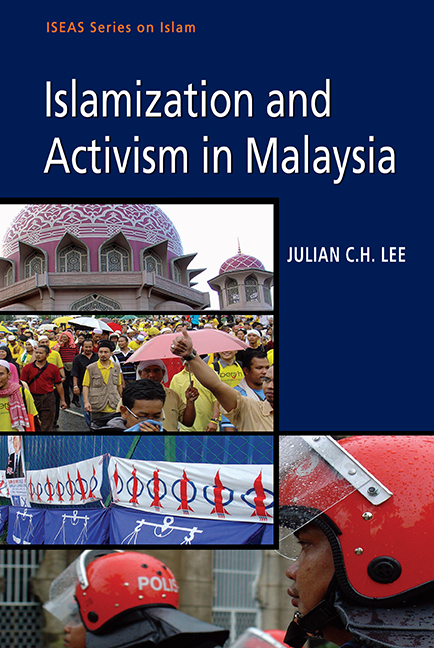Book contents
- Frontmatter
- Dedication
- Contents
- Acknowledgements
- Abbreviations
- Introduction
- 1 On Islam, Democracy, and Activism
- 2 A Short History of Malaysia
- 3 Malaysia as an Islamic State: The Debate
- 4 Conflict of Jurisdiction: Civil versus Syariah Law
- 5 Islamist Lawyers’ Views
- 6 Social Activism and the Article 11 Coalition
- 7 Questioning Orthodoxies, Criticizing Zealotry
- 8 Electoral Engagements
- Conclusion: Islam, Democracy, and Activism in Malaysia
- Bibliography
- Index
- About the Author
- Plate section
8 - Electoral Engagements
Published online by Cambridge University Press: 21 October 2015
- Frontmatter
- Dedication
- Contents
- Acknowledgements
- Abbreviations
- Introduction
- 1 On Islam, Democracy, and Activism
- 2 A Short History of Malaysia
- 3 Malaysia as an Islamic State: The Debate
- 4 Conflict of Jurisdiction: Civil versus Syariah Law
- 5 Islamist Lawyers’ Views
- 6 Social Activism and the Article 11 Coalition
- 7 Questioning Orthodoxies, Criticizing Zealotry
- 8 Electoral Engagements
- Conclusion: Islam, Democracy, and Activism in Malaysia
- Bibliography
- Index
- About the Author
- Plate section
Summary
This chapter seeks to demonstrate how the electoral system in Malaysia has facilitated the Islamization I have thus far described, how it is biased towards maintaining BN rule, and how some elements of civil society have tried to advocate for electoral reform.
My description of the Malaysian electoral system will begin with a discussion of the socio-political impacts of the “first-past-the-post” electoral system which is in effect in Malaysia. I am concerned to show how it constrains the diversification of voices and how it encouraged PAS's declaration in 2004 that it would strive to establish an Islamic state. I will then examine how the practice of Malaysian elections further serves to constrain minority voices and to confirm the ongoing rule of the BN and the socio-political status quo. This discussion shall be undertaken with reference to the campaign of one PKR candidate during the 2004 elections. I will then examine how Malaysians have reacted to these electoral constraints and their effects by describing the heightened social activism that surrounded the 2008 elections. The cause of this social activism lay in dissatisfaction with government policy and unaccountability and, importantly, in the effects of Islamization. The reduction in democratic space resulted in citizens seeking ways to participate in democracy beyond participating directly in elections. I discuss the large public rallies that took place before the elections and the Women's Candidacy Initiative.
THE FIRST-PAST-THE-POST SYSTEM
In Malaysian elections, the winners of seats in the lower house are decided according to a simple first-past-the-post system. For the lower house, whichever candidate garners the most votes in an electorate wins the seat and any vote for a losing candidate has no representational value. The members of the upper house are largely appointed by the Sultan, and the house is not composed of members of parties in proportion to the popular vote.
For the purposes of my discussion here, I will compare the first-past-the-post system with what is often referred to as proportional representation. In short, this differs from first-past-the-post systems in that, a vote for a losing candidate or party is not wasted and retains representational value. Thus, for example, if a party were to lose every seat it contested, if it managed to nevertheless win 10 per cent of the total vote, that party would gain 10 per cent of the seats in the upper house of Parliament.
- Type
- Chapter
- Information
- Islamization and Activism in Malaysia , pp. 110 - 131Publisher: ISEAS–Yusof Ishak InstitutePrint publication year: 2010



